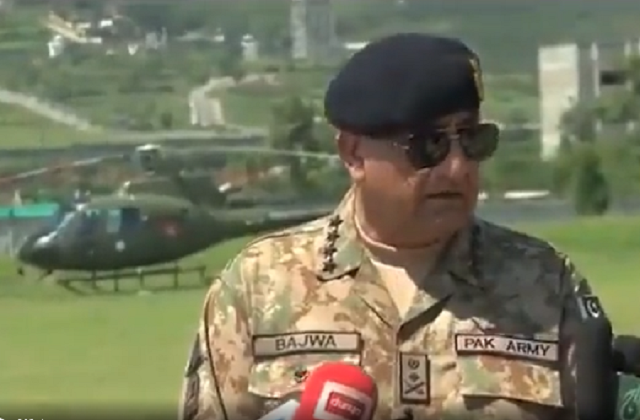COAS to visit flood-hit areas of KP, Punjab
Relief efforts in flood-hit areas across the country continue, says ISPR

Chief of the Army Staff (COAS) General Qamar Javed Bajwa will visit flood-hit areas of Khyber Pakhtunkhwa (KP) and Punjab on Thursday, according to a statement from the Inter-Services Public Relations (ISPR).
The ISPR added that relief efforts in flood-hit areas across the country are underway by the Pakistan Army.
Rescue and relief efforts
According to the military's media wing, 157 Army helicopter sorties evacuated 1,087 stranded people and transported 72 tons of relief items to the flood-affected areas.
More than 50,000 individuals have been shifted to safer locations from calamity-hit areas and over 51,000 patients were given health assistance in various medical camps and were provided free medicine for 3-5 days, added the ISPR.
Read: Army helicopters rescue stranded families in Swat
Relief collection camps
Pakistan Army has also established 221 relief items collection points across the country as part of a donation drive to provide relief to flood affectees.
The army has established 85 collection points in Punjab, 15 in K-P, 43 in Sindh, 41 in Balochistan, another 30 in AJK and three in Gilgit-Baltisan.
A total of 1,231 tons of relief items including medicines were collected and are now being dispatched to flood victims.
The military's media wing stated that 25,000 ready-to-eat meals were also being sent to flood-hit areas.
Communication infrastructure
According to the latest update by the military, 'timely' restoration has been ensured for communication infrastructure including the Karakoram Highway (KKH), which was severed at several points due to floods and landslides, and the Jaglot-Skardu Road by the National Highway Authority and the Frontier Works Organisation
The ISPR also added that additional engineer and medical detachments and resources were moved to Karachi to aid in rescue and relief operations in Sindh.
Army Flood Control help line
The Pakistan Army has established a flood control help line and has advised people to reach out on these emergency numbers for assistance: 1125 for KP and 1135 for the rest of Pakistan.
Torrential rains and flooding have submerged a third of Pakistan and killed more than 1,100 people, including 380 children as the United Nations appealed for aid on Tuesday for what it described as an "unprecedented climate catastrophe."
The country has received nearly 190% more rain than the 30-year average in the quarter through August this year, totalling 390.7 millimetres (15.38 inches). Sindh province, with a population of 50 million, was hardest hit, getting 466% more rain than the 30-year average.
Torrential rain has also triggered flash floods that have crashed down from northern mountains, destroying buildings and bridges, and washing away roads and standing and stored crops.



















COMMENTS
Comments are moderated and generally will be posted if they are on-topic and not abusive.
For more information, please see our Comments FAQ